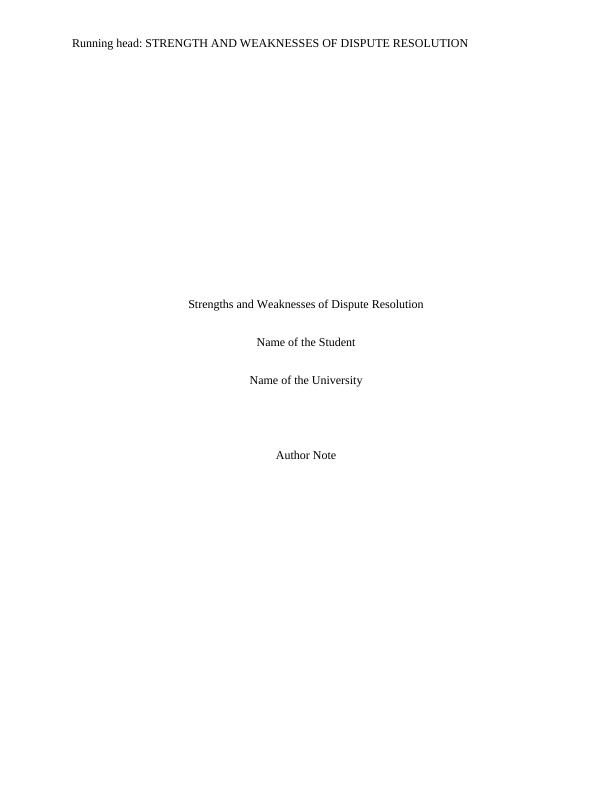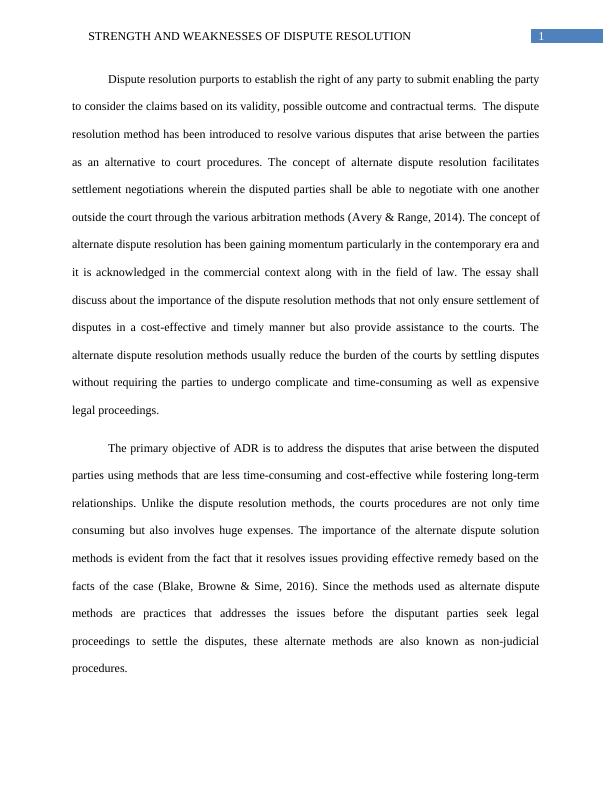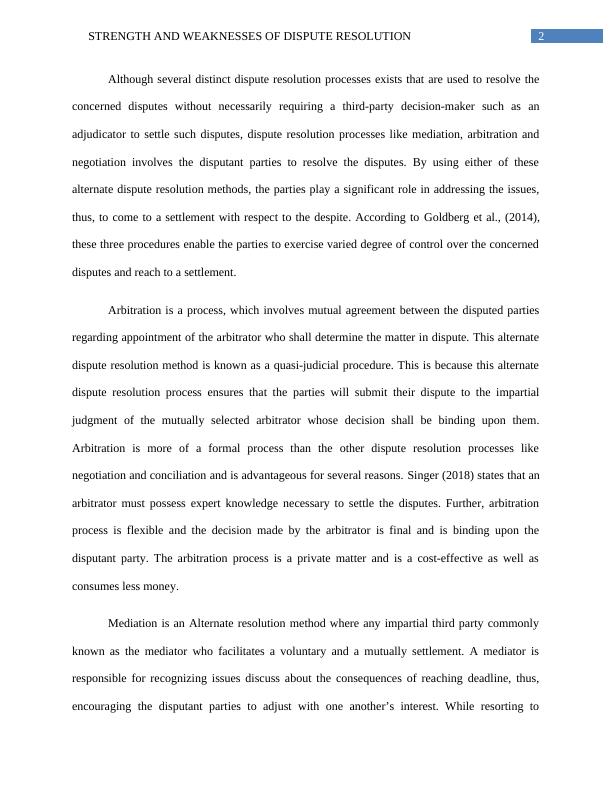Strengths and Weaknesses of Dispute Resolution
Added on 2023-06-10
8 Pages2009 Words266 Views
Running head: STRENGTH AND WEAKNESSES OF DISPUTE RESOLUTION
Strengths and Weaknesses of Dispute Resolution
Name of the Student
Name of the University
Author Note
Strengths and Weaknesses of Dispute Resolution
Name of the Student
Name of the University
Author Note

1STRENGTH AND WEAKNESSES OF DISPUTE RESOLUTION
Dispute resolution purports to establish the right of any party to submit enabling the party
to consider the claims based on its validity, possible outcome and contractual terms. The dispute
resolution method has been introduced to resolve various disputes that arise between the parties
as an alternative to court procedures. The concept of alternate dispute resolution facilitates
settlement negotiations wherein the disputed parties shall be able to negotiate with one another
outside the court through the various arbitration methods (Avery & Range, 2014). The concept of
alternate dispute resolution has been gaining momentum particularly in the contemporary era and
it is acknowledged in the commercial context along with in the field of law. The essay shall
discuss about the importance of the dispute resolution methods that not only ensure settlement of
disputes in a cost-effective and timely manner but also provide assistance to the courts. The
alternate dispute resolution methods usually reduce the burden of the courts by settling disputes
without requiring the parties to undergo complicate and time-consuming as well as expensive
legal proceedings.
The primary objective of ADR is to address the disputes that arise between the disputed
parties using methods that are less time-consuming and cost-effective while fostering long-term
relationships. Unlike the dispute resolution methods, the courts procedures are not only time
consuming but also involves huge expenses. The importance of the alternate dispute solution
methods is evident from the fact that it resolves issues providing effective remedy based on the
facts of the case (Blake, Browne & Sime, 2016). Since the methods used as alternate dispute
methods are practices that addresses the issues before the disputant parties seek legal
proceedings to settle the disputes, these alternate methods are also known as non-judicial
procedures.
Dispute resolution purports to establish the right of any party to submit enabling the party
to consider the claims based on its validity, possible outcome and contractual terms. The dispute
resolution method has been introduced to resolve various disputes that arise between the parties
as an alternative to court procedures. The concept of alternate dispute resolution facilitates
settlement negotiations wherein the disputed parties shall be able to negotiate with one another
outside the court through the various arbitration methods (Avery & Range, 2014). The concept of
alternate dispute resolution has been gaining momentum particularly in the contemporary era and
it is acknowledged in the commercial context along with in the field of law. The essay shall
discuss about the importance of the dispute resolution methods that not only ensure settlement of
disputes in a cost-effective and timely manner but also provide assistance to the courts. The
alternate dispute resolution methods usually reduce the burden of the courts by settling disputes
without requiring the parties to undergo complicate and time-consuming as well as expensive
legal proceedings.
The primary objective of ADR is to address the disputes that arise between the disputed
parties using methods that are less time-consuming and cost-effective while fostering long-term
relationships. Unlike the dispute resolution methods, the courts procedures are not only time
consuming but also involves huge expenses. The importance of the alternate dispute solution
methods is evident from the fact that it resolves issues providing effective remedy based on the
facts of the case (Blake, Browne & Sime, 2016). Since the methods used as alternate dispute
methods are practices that addresses the issues before the disputant parties seek legal
proceedings to settle the disputes, these alternate methods are also known as non-judicial
procedures.

2STRENGTH AND WEAKNESSES OF DISPUTE RESOLUTION
Although several distinct dispute resolution processes exists that are used to resolve the
concerned disputes without necessarily requiring a third-party decision-maker such as an
adjudicator to settle such disputes, dispute resolution processes like mediation, arbitration and
negotiation involves the disputant parties to resolve the disputes. By using either of these
alternate dispute resolution methods, the parties play a significant role in addressing the issues,
thus, to come to a settlement with respect to the despite. According to Goldberg et al., (2014),
these three procedures enable the parties to exercise varied degree of control over the concerned
disputes and reach to a settlement.
Arbitration is a process, which involves mutual agreement between the disputed parties
regarding appointment of the arbitrator who shall determine the matter in dispute. This alternate
dispute resolution method is known as a quasi-judicial procedure. This is because this alternate
dispute resolution process ensures that the parties will submit their dispute to the impartial
judgment of the mutually selected arbitrator whose decision shall be binding upon them.
Arbitration is more of a formal process than the other dispute resolution processes like
negotiation and conciliation and is advantageous for several reasons. Singer (2018) states that an
arbitrator must possess expert knowledge necessary to settle the disputes. Further, arbitration
process is flexible and the decision made by the arbitrator is final and is binding upon the
disputant party. The arbitration process is a private matter and is a cost-effective as well as
consumes less money.
Mediation is an Alternate resolution method where any impartial third party commonly
known as the mediator who facilitates a voluntary and a mutually settlement. A mediator is
responsible for recognizing issues discuss about the consequences of reaching deadline, thus,
encouraging the disputant parties to adjust with one another’s interest. While resorting to
Although several distinct dispute resolution processes exists that are used to resolve the
concerned disputes without necessarily requiring a third-party decision-maker such as an
adjudicator to settle such disputes, dispute resolution processes like mediation, arbitration and
negotiation involves the disputant parties to resolve the disputes. By using either of these
alternate dispute resolution methods, the parties play a significant role in addressing the issues,
thus, to come to a settlement with respect to the despite. According to Goldberg et al., (2014),
these three procedures enable the parties to exercise varied degree of control over the concerned
disputes and reach to a settlement.
Arbitration is a process, which involves mutual agreement between the disputed parties
regarding appointment of the arbitrator who shall determine the matter in dispute. This alternate
dispute resolution method is known as a quasi-judicial procedure. This is because this alternate
dispute resolution process ensures that the parties will submit their dispute to the impartial
judgment of the mutually selected arbitrator whose decision shall be binding upon them.
Arbitration is more of a formal process than the other dispute resolution processes like
negotiation and conciliation and is advantageous for several reasons. Singer (2018) states that an
arbitrator must possess expert knowledge necessary to settle the disputes. Further, arbitration
process is flexible and the decision made by the arbitrator is final and is binding upon the
disputant party. The arbitration process is a private matter and is a cost-effective as well as
consumes less money.
Mediation is an Alternate resolution method where any impartial third party commonly
known as the mediator who facilitates a voluntary and a mutually settlement. A mediator is
responsible for recognizing issues discuss about the consequences of reaching deadline, thus,
encouraging the disputant parties to adjust with one another’s interest. While resorting to

End of preview
Want to access all the pages? Upload your documents or become a member.
Related Documents
Strengths and Weaknesses of Alternate Dispute Resolutionlg...
|13
|3265
|81
Alternative Dispute Resolution in Lawlg...
|11
|2656
|107
Advantages and Disadvantages of Alternative Dispute Resolutionlg...
|9
|2496
|55
Advantages and Disadvantages of Alternative Dispute Resolutionlg...
|7
|1836
|59
Alternative Dispute Resolution: Modes and Role in Finding Quick and Effective Solutionslg...
|5
|1347
|72
Alternative Dispute Resolution: Modes and Benefitslg...
|5
|1279
|378
